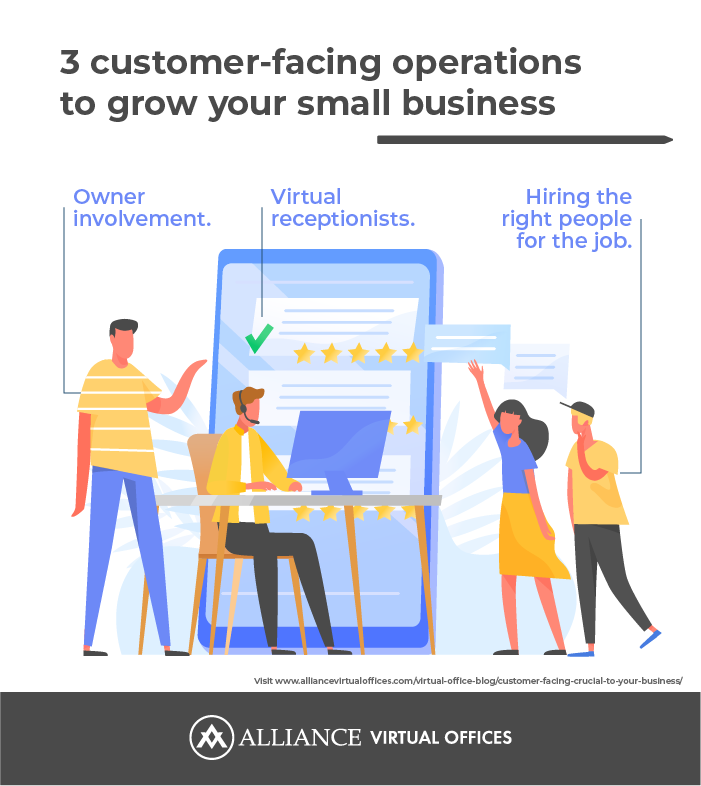- What does ‘customer facing’ mean?
- Why do customer-facing roles still matter?
- How can you use customer-facing roles to grow your business?
Q: What does customer-facing mean?
A: Customer-facing means interacting directly with customers; by nurturing these interactions and focusing on what you can do for the customer rather than what the customer can do for your company, you can strengthen the customer experience while attracting new business.
The modern working environment looks completely different from the working environment of earlier decades.
Society seems to be moving towards automation as quickly as possible, supply chains have been streamlined, virtual businesses are becoming more and more accessible to everyday Americans, yet customer service remains just as crucial as ever.
It doesn’t look the same that it did years ago, but good customer service is still equally, if not more, important than it ever has been. Nevertheless, businesses continue to undervalue the importance of customer-facing roles.
Despite this, good customer service remains a pillar of successful businesses. So what is the customer-facing meaning, and what does it look like in the modern workforce?
We know it’s a lot to take in, so let’s break up the article and make it a bit easier to digest below!
- What does it mean to be ‘customer facing’?
- Why do these customer-facing positions matter to small businesses?
- How can I use these customer-facing roles to grow my small business?
What does ‘customer facing’ mean?
Customer-facing is most simply defined as “dealing with customers”. With technology moving so quickly and more of the customer experience being automated, the moments you’re interacting directly with customers should be handled with the utmost empathy in an attempt to build a lasting relationship with your customers.
If customer-facing means dealing with customers, what is the opposite? Non-customer-facing jobs are jobs that deal exclusively with the business aspect of things that customers aren’t privy to.
Also referred to as ‘business-facing’, these jobs are comparable to the framework of a house, without the business-facing jobs, customer-facing positions wouldn’t have a business to introduce people to.
Jobs like accountants or copywriters are a few quick examples of business-facing positions.
Often times these customer-facing positions serve as the first point of contact between the customer and the business, therefore the importance of these positions cannot be understated.
So what exactly are these jobs, and how can they add value to your small business?
Let’s take a look at some customer-facing positions below!
See how other cultures are being affected by the digitization and automation of the workforce!
Outside Sales Representatives
Outside sales reps are in the field physically bringing business to the company. They’re regularly traveling, and meeting with clients, and their success is wholly dependent on their customer service experience.
This initial contact is paramount to the customer’s first impression of the company – this is why focusing on customer-facing positions is important!
Cashiers
Cashiers are responsible for making sure the final interaction with the customer goes smoothly.
They’re face-to-face with the customers, and any grievances and complaints those customers might have are directed straight to the cashier.
This requires a level head and enough emotional intelligence to ensure that the arbitrary complaints of customers are met with compassion, all while keeping the business’s bottom line in mind.
Customer Success Managers
Similar to outside sales reps, customer service managers are responsible for bringing new customers to the business as well while still cultivating the relationship between previous customers.
Customer service managers act as liaisons for the customers to the rest of the business, and any negative experience the customer may or may not have with these CSM will be reflected on the rest of the business.
Social Media Customer Care Agent
Social media customer care agents, or SMCCAs for short, are responsible for the digital interactions between your business and the customer.
Using social media to interact with these customers streamlines the customer experience because you’re allowing customers to reach your employees on platforms that they’re both already using.
Virtual Receptionist
It’s only natural that with the rise of technology you are now able to work a customer-facing job without ever actually seeing the client.
Virtual receptionists are in charge of screening phone calls, making appointments, and taking payment from customers.
This position is vital because that empathy and level-headedness are of particular merit when you’re speaking to customers over the phone.
Check out these 200+ must-know customer service statistics!
These are just a few of the numerous customer-facing positions available.
The modern workplace might have a more remote and virtual focus, but that doesn’t mean client-facing positions have disappeared, they just look a little bit different.
With the rise of virtual offices and other remote opportunities for small businesses, the importance of good client-facing roles can’t be overstated.
According to this article by the Yale School of Management, businesses regularly use outdated metrics to gauge the value of customer service, which in turn leads them to seriously undervalue its importance.
Why do customer-facing roles matter to your small business?
Customer-facing positions have proven that, barring an unforeseen technical black swan event, they are here to stay.
Even as more and more businesses turn to remote work to keep up with the ever-changing landscape, the market continues to value client-facing roles.
People want to feel valued. It’s difficult to show a customer your appreciation when every aspect of your business is automated and impersonal.
As a number of companies continue to undervalue the importance of a customer-facing role, the businesses that invest in these positions will and already do stand out.
One easy to recognize example is companies with dedicated social media marketing teams, or other non-traditional forms of marketing, that understand the importance of being customer-facing.
Although marketing in the current digital landscape looks different than it did two decades ago, it still focuses entirely on customer interaction.
Something as simple as clicking on a Facebook advertisement might not feel like customer interaction, but it is.
Click here to read about where direct-to-consumer businesses are struggling.
The current technological landscape allows for customer-facing business to take place without any direct customer interaction.
By utilizing a variety of digital marketing techniques like content marketing, SEO, or social media marketing initiatives, you are fostering a relationship with the potential customer by introducing your business in a way that is palatable to them.
Some wonder if it’s possible to use software to automate the customer-facing tasks, and the answer is: not really.
There is software that can help make the client-facing positions easier to manage, but more often than not, the automation is cold and lacks human touch.
Essentially, customer-facing roles matter to your business because investing in the training of customer service employees, outsourcing modern marketing techniques, or even utilizing some of these modern techniques yourself will differentiate your business from the competition.
How can you use customer-facing operations to grow your small business?
With customer-facing operations being so broad in the current market, it’s easy to get overwhelmed with exactly how you should position these roles. Let’s list a few!
- Owner involvement
- Hiring the right people for the job
- Virtual receptionists
Owner Involvement
We’ll start off with something self-explanatory to ease into it! One excellent way to use customer-facing operations for small business owners is to get more personally involved!
Customers love feeling like they’re being treated like royalty. Special treatment from cashiers and wait-staff is always nice, but when the proprietor of the establishment is treating you unique, it’s hard not to become attached.
By integrating yourself into roles that put you in direct contact with the customer, you are silently letting each of them know that you care and that you personally want their business.
This personal touch is a key customer-facing skill, making customers feel heard and valued is one of the best ways to receive word-of-mouth advertising too.
Customers are far more likely to discuss the friendly owner who helped them with their purchases than they are to discuss the automated operator they still had to spend 15 minutes on hold to tentatively speak with.
It is essential to mention that while it’s important for the owner to be involved, it’s also not smart for that same owner to spend 100% of their time in a customer-facing role.
Dedicating that much time to the customer experience could detract from the true goal of the business, so remember that a healthy balance is necessary.
As a small business owner, search for opportunities that allow you to connect not only with your customers but with your small business’s employees as well.
By paying attention to the needs of your company and focusing on customer-facing business, your small business will stand out immediately!
Read more: 13 Simple Ways Business Owners Can Make Customers Feel Valued
Hiring the right person for the job
Finding good, quality labor is never easy. Finding good, quality labor that is also capable of using customer-facing skills to bring new business is even tougher.
The first decision you’ll need to make when searching for someone to fill the customer-facing role is whether or not you’re looking to hire W-2 employees or freelancers.
Although there are benefits to both of these options, let’s go ahead and take a look at some pros and cons of each!
Read more: The Power Word-of-Mouth Has In Marketing, And How To Cultivate It
W-2 Employees
- W-2 employees are standard full or part-time employees
- Hiring a W-2 employee means that you’ll have to put them on the payroll
- This means you will have to pay them a consistent hourly wage
- Once W-2 employees are onboarded and qualify, you’ll likely have to give them benefits
- These employees are part of your business, so you’re able to prevent them from working for the competition while under your employ
- While the W-2 employees are working for you, you may have the rights to any of the original concepts or products they come up with
Freelancers
- Otherwise known as independent contractors
- Freelancers are separate from your business
- Due to this, you don’t pay freelancers through payroll
- Hiring freelancers will typically be less expensive in the long run
- Because of the ease and noncommittal nature of hiring freelancers, you’ll be hard-pressed to find a freelancer that is loyal to your brand
- Your business has no rights over the freelancers’ work with the exception of the project they are being paid for
W-2 employees and freelancers both have a place in the workforce. If your small business is looking to fill a customer-facing role at a small storefront with a few employees – it’s probably better to hire a W-2 employee and foster some level of brand loyalty with them.
If your online small business is looking exclusively for help on a social media marketing campaign, it probably doesn’t make sense to go through all of the onboarding and payroll woes just for a W-2 employee.
Overall, the decision to hire a freelancer or a W-2 employee boils down to what you are trying to accomplish.
By and large, if you’re looking to save money and just need someone with customer-facing skills for the short term, freelancer employees are your best bet.
Alternatively, if you’re looking to fill a long-term customer-facing role, W-2 employees will work.
Independently of the normal hiring process, you can also take advantage of the modern technological landscape to automate some of the processes or hire remote workers to handle the digital customer-facing business.
Virtual Receptionists
In 2000, the idea of hiring a receptionist for your online small business to work from the comfort of their own home was nothing more than science fiction.
Now thanks to Alliance Virtual Offices’s live receptionist services, you can have all of the benefits of customer-facing positions without so much as a physical storefront.
Hiring a virtual receptionist to handle the customer-facing roles adds a level of personality to your online business.
By using a virtual receptionist, potential customers can see that you’re dedicated to making them feel comfortable.
The virtual receptionist also allows the owner to focus on other aspects of their business as well.
Although it’s still crucial for business owners to have some customer-facing experiences, a virtual receptionist allows them to dedicate their time to high-quality marketing initiatives, supplier searches, employee hunting, and other growth strategies.
Conclusion
Being customer-facing means interacting with the consumer.
The customer-facing operations within your small business have a direct correlation to the success of your marketing and overall sales.
Further Reading:
- This Attorney Answering Service Rapidly Boosts Your Lead Generation
- Time is Money: The ROI of Using A Virtual Receptionist Business Phone Number
- LLC for the Digital Entrepreneur: What You Need to Know When Traveling
- How to Grow Your Business When You Hate Talking on the Phone
More often than not, adding customer service solutions to your small business is the best way to handle these operations.
The specifics of your customer-facing operations rely solely on whatever it is you would like to accomplish.
There are several ways to use these positions effectively, and it’s up to you to decide how that is!
If you’re looking to add customer-facing positions to your business, a virtual receptionist from Alliance Virtual Offices is a great place to start.
This gives you access to unlimited local and long-distance calling, a complete online control panel, custom recordings and messages, and a whole slew of other benefits that will help your small business reach the heights you know it can.






